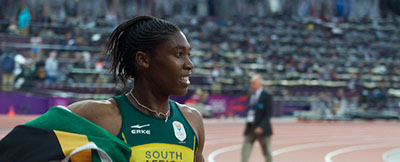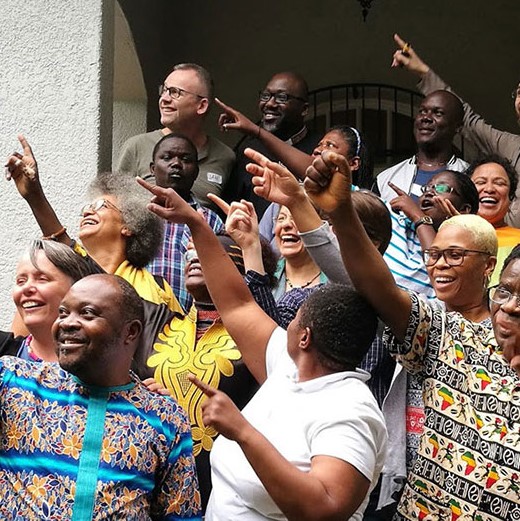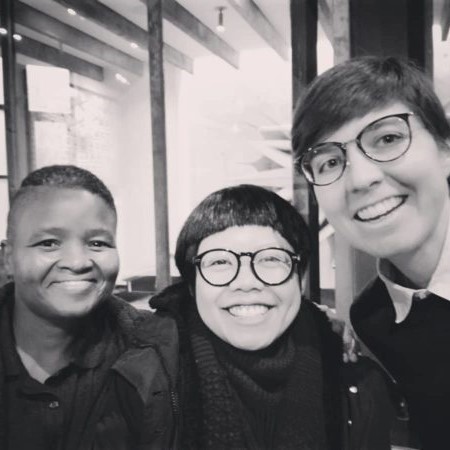
“I am a living testimony of God.” – Caster Semenya, BBC One interview, 3 May 2019, Doha
As the Global Interfaith Network for People of All Sexes, Sexual Orientations, Gender Identities and Expressions (GIN), we condemn the recent ruling of the Court of Arbitration for Sport1 regarding the testosterone levels of female athletes.
As GIN, we assert, with Caster, that she is created in the image of God, and that the physiological characteristics (including her testosterone levels) that make her extraordinary are integral to that image as it is reflected in her person.
As the Rev Judith Kotze, GIN Board Co-Chair, says, “We celebrate with Caster both our common humanity and uniqueness as gifts from God who is the very Ground of Being from which we live, love and move.”
In addition, we join partners and colleagues in denouncing the deeply discriminatory nature of the IAAF’s ruling, based in the historically misogynistic and racist attitudes of the sports industry – and other fields – which aim to control women’s bodies and particularly those of women from the Global South.
The ruling came in a case brought by the South African middle-distance runner Caster Semenya against the International Association of Athletics Federations (IAAF) that challenged the presumed role of testosterone in enhancing the body’s performance in certain sports activities, above nutrition, coaching and training. After ten years of scrutiny by sports’ federations, Caster Semenya had appealed against the IAAF’s proposed new rule (announced in April 2018 and which came into force in November 2018) reinstating efforts to regulate testosterone levels for female athletes with differences of sex development competing in restricted events from 400 meters to 1 mile. The rule is officially recognized by the Court as discriminatory but is said to be aimed at ensuring fair and meaningful competition for all women.
This ruling shows an absolute disrespect for women’s being, their body and spirit. It means that some women with no prior health complaints will be forced to inject their bodies with hormone treatments to lower their naturally-occurring levels of testosterone, in the absence of support by the available science, if they want to continue to compete in these races. And it classifies intersex women – naturally occurring examples of the diversity of creation – as “not real women”. Furthermore, the new rule seems to specifically target women from the Global South. Indeed, the IAAF has identified several events where they believe there to be a correlation between testosterone levels and performance, but the new rule only targets events which are currently being dominated by women from Sub-Saharan Africa (the others, excluded from the rule, are currently dominated by white women).2
“Variation in sex characteristics is a naturally occurring aspect of creation. Pushing athletes to change their God-given physiology flies in the face of faith-based understandings of the nature of creation, human personhood and dignity. It is a slap in the face of God,” says Toni Kruger-Ayebazibwe, Executive Director of GIN.
In March of this year, the United Nations Human Rights Council adopted a resolution that expresses concerns about existing discriminatory regulations, rules and practices that require some women and girl athletes to medically reduce their blood testosterone levels by undergoing, what it calls “unnecessary, humiliating and harmful” medical procedures or hormone therapy in order to participate in women’s events in competitive sports.3
GIN-SSOGIE joins Caster Semenya, and others, who have contested the rules calling them “’discriminatory, irrational, unjustifiable’ and a violation of the rules of sport and universally-recognized human rights.”4
We express our support for Caster Semenya and all female athletes who do not fall in the strict binary framework which official sports’ federations are imposing on female athletes around the world. As her lawyers pointed out last week, ““her unique genetic gift should be celebrated, not regulated.”5
[1] On Wednesday 1st May 2019, the Court of Arbitration for Sport ruled that female athletes with naturally elevated levels of testosterone (five nanomoles per liter and above) in certain races of major competitions, including the Olympics, unless they reduced the hormone levels in their bodies. Under this new rule, a female athlete who does not want to lower her testosterone levels faces several difficult choices: change the distance at which she races to beyond one mile; compete against men; enter competitions for so-called intersex athletes, if any are offered; or give up her eligibility to perform in the most prestigious competitions like the Olympics.
[2] Strashin, J. “What’s the real problem with Caster Semenya?”, CBC sports website, May 14th 2018, URL: https://www.cbc.ca/sports/olympics/trackandfield/caster-semenya-cultural-bias-1.4661929
[3] Daniele Palleta, “First UN Resolution on the Rights of Intersex Persons: UN calls to end discrimination of women and girls in sports, including women born with variations of sex characteristics”, ILGA website, March 22nd 2019, URL: https://ilga.org/first-un-resolution-rights-intersex-persons-women-sport
[4] Longman, J. « Caster Semenya Will Challenge Testosterone Rule in Court » New York Times, June 18th 2018, URL: https://www.nytimes.com/2018/06/18/sports/caster-semenya-iaaf-lawsuit.html?module=inline
[5] Longman J. and Macur J. “Caster Semenya Loses Case to Compete as a Woman in All Races”, New York Times, May 1st 2019, URL: https://www.nytimes.com/2019/05/01/sports/caster-semenya-loses.html





